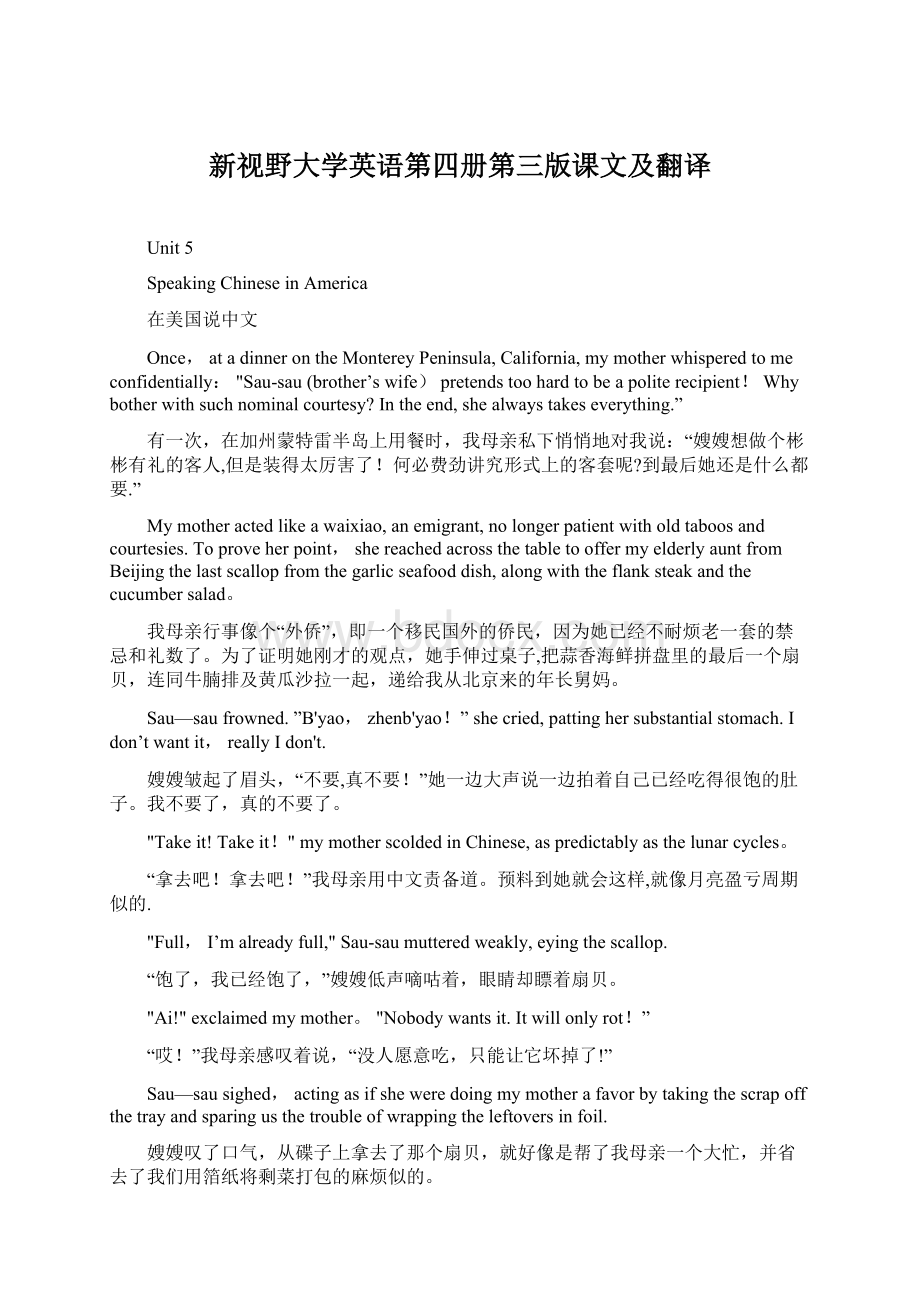 新视野大学英语第四册第三版课文及翻译.docx
新视野大学英语第四册第三版课文及翻译.docx
- 文档编号:4137304
- 上传时间:2022-11-28
- 格式:DOCX
- 页数:19
- 大小:47.14KB
新视野大学英语第四册第三版课文及翻译.docx
《新视野大学英语第四册第三版课文及翻译.docx》由会员分享,可在线阅读,更多相关《新视野大学英语第四册第三版课文及翻译.docx(19页珍藏版)》请在冰豆网上搜索。

新视野大学英语第四册第三版课文及翻译
Unit5
SpeakingChineseinAmerica
在美国说中文
Once,atadinnerontheMontereyPeninsula,California,mymotherwhisperedtomeconfidentially:
"Sau-sau(brother’swife)pretendstoohardtobeapoliterecipient!
Whybotherwithsuchnominalcourtesy?
Intheend,shealwaystakeseverything.”
有一次,在加州蒙特雷半岛上用餐时,我母亲私下悄悄地对我说:
“嫂嫂想做个彬彬有礼的客人,但是装得太厉害了!
何必费劲讲究形式上的客套呢?
到最后她还是什么都要.”
Mymotheractedlikeawaixiao,anemigrant,nolongerpatientwitholdtaboosandcourtesies.Toproveherpoint,shereachedacrossthetabletooffermyelderlyauntfromBeijingthelastscallopfromthegarlicseafooddish,alongwiththeflanksteakandthecucumbersalad。
我母亲行事像个“外侨”,即一个移民国外的侨民,因为她已经不耐烦老一套的禁忌和礼数了。
为了证明她刚才的观点,她手伸过桌子,把蒜香海鲜拼盘里的最后一个扇贝,连同牛腩排及黄瓜沙拉一起,递给我从北京来的年长舅妈。
Sau—saufrowned.”B'yao,zhenb'yao!
”shecried,pattinghersubstantialstomach.Idon’twantit,reallyIdon't.
嫂嫂皱起了眉头,“不要,真不要!
”她一边大声说一边拍着自己已经吃得很饱的肚子。
我不要了,真的不要了。
"Takeit!
Takeit!
"mymotherscoldedinChinese,aspredictablyasthelunarcycles。
“拿去吧!
拿去吧!
”我母亲用中文责备道。
预料到她就会这样,就像月亮盈亏周期似的.
"Full,I’malreadyfull,"Sau-saumutteredweakly,eyingthescallop.
“饱了,我已经饱了,”嫂嫂低声嘀咕着,眼睛却瞟着扇贝。
"Ai!
"exclaimedmymother。
"Nobodywantsit.Itwillonlyrot!
”
“哎!
”我母亲感叹着说,“没人愿意吃,只能让它坏掉了!
”
Sau—sausighed,actingasifsheweredoingmymotherafavorbytakingthescrapoffthetrayandsparingusthetroubleofwrappingtheleftoversinfoil.
嫂嫂叹了口气,从碟子上拿去了那个扇贝,就好像是帮了我母亲一个大忙,并省去了我们用箔纸将剩菜打包的麻烦似的。
Mymotherturnedtoherbrother,anexperiencedChinesemagistrate,visitingusforthefirsttime.”InAmerica,aChinesepersoncouldstarvetodeath。
Ifyoudon'tbreachtheoldrulesofetiquetteandsayyouwantit,theywon’taskyouagain."
我母亲转头看着她兄长——一位经验丰富的中国地方法官,这是他初次来看我们。
她说:
“在美国,一个中国人可能会饿死。
要是你不打破老一套的礼数说你要吃,他们就不会再问你了。
”
Myunclenoddedandsaidheunderstoodfully:
Americanstakethingsquicklybecausetheyhavenotimetobepolite。
我舅舅点点头,说他完全理解:
美国人待人接物快速迅捷,因为他们没有时间客气来客气去。
IreadanarticleinTheNewYorkTimesMagazineonchangesinNewYork'slittleculturalcolonyofChinatown,wheretheauthormentionedthattheinterwovenconfigurationofChineselanguageandculturerendersitsspeechindirectandpolite.Chinesepeopleareso"discreetandmodest”,thearticlestarted,thattherearen'tevenwordsfor”yes”and”no".
我在《纽约时报杂志》上读到过一篇文章,描述的是纽约市内的中国城这一小块文化聚居地的变迁。
作者在文章中提到,中国语言与文化错综交织,使中文十分委婉和客套。
中国人是如此“谨慎和谦虚”,文章开头写道,以至于他们都没有词语来表达“是”和“不是".
Whydopeoplekeepfabricatingtheserumors?
Ithought。
TheydescribeusasthoughwewereatribeofthoselittledollssoldinChinatowntouristshops,headsmovingupanddownincontentedagreement!
我思索着,为什么人们会不断地编造这样的谣言呢?
他们把我们描述得就像是唐人街旅游品商店里出售的一批小布娃娃。
那些布娃娃的头不停地上下晃动,似乎对一切都心满意足,完全赞同。
Asanychildofimmigrantparentsknows,thereisaspecialkindofdoublebindattachedtoknowingtwolanguages.Myparents,forexample,spoketomeinbothChineseandEnglish;IspokebacktotheminEnglish.
生于移民家庭的孩子都清楚,有一种特殊的两难境地与说两种语言的生活联系在一起。
比如我父母,他们和我说话时中文和英文都用,但我和他们说话时只用英文.
"Amy—ah!
"they’dscoldme。
“艾米啊!
”他们会这样责备我.
"what?
”I'danswerback.
“怎么啦?
"我会回问道.
"Donotquestionuswhenwecall,”they’dscoldinChinese."It’snotrespectful."
“我们叫你时,不要对我们反问,”他们会用中文训斥道。
“这是不礼貌的!
”
”whatdoyoumean?
”
“你们什么意思?
”
"Ai!
Didn’twejusttellyounottoquestion?
”isIfIconsidermyupbringingcarefully,IfindtherewasnothingdiscreetabouttheChineselanguageIgrewupwith,nocensorshipforthesakeofpoliteness.Myparentsmadeeverythingabundantlyclearintheirconsecutivedemands:
”Ofcourseyouwillbecomeafamousaerospaceengineer,theyprodded.”Andyes,aconcertpianistontheside。
”
仔细想想自己的成长过程,我发现,我从小到大所接触到的中文并不是什么特别谨慎的语言,也不存在出于客气而对所说的话进行仔细检查的现象。
我父母向我提一连串的要求时,总是把一切都表述得清清楚楚:
“你当然会成为著名的航空工程师,"他们会鼓励我说,“对了,你业余时间还要做音乐会的钢琴师。
”
ItseemsthatthemoreforcefulproceedingsalwaysspilledoverintoChinese:
"Notthatway!
Youmustwashricesonotasinglegrainislost."
似乎更加强硬的事情总是通过中文倾泻出来:
“不能那样!
你淘米的时候,必须一粒都不漏。
”
HavinglistenedtobothChineseandEnglish,I'msuspiciousofcomparisonsbetweenthetwolanguages,asInoticethereciprocalchallengestheyeachpresent.EnglishspeakerssayChineseisextremelydifficultbecausedifferentwordscanbedenotedbyverysubtlevariationsintone。
Englishisoftenbracketedwiththelabelofinconsistency,alanguageoftoomanybrokenrules。
由于一直同时听着中英文两种语言,故而我对它们之间的任何对比总是心存怀疑,因为我注意到它们各自都有对方所没有的难点。
说英文的人会认为中文极其难,因为中文用非常微妙的声调变化就可以表示不同的词语。
而英文则常常被认为缺乏一致性,因为英文具有太多不合规则的用法。
Evenmoredangerous,inmyview,isthetemptationtoviewthegulfbetweendifferentlanguagesandbehaviorintranslation。
TolistentomymotherspeakEnglish,anoutsidespectatormightmakethedeductionthatshehasnoconceptofthetemporaldifferencesofpastandfutureorthatsheisgenderblindbecauseshereferstomyhusbandas”she”.Ifonewerenotcareful,onemightalsogeneralizethatallChinesepeopletakeanindirectroutetogettothepoint.Itis,rather,mymother'sindividualtendencytoornamentherlanguageandwanderaroundabit。
在我看来,更危险的做法是,人们往往倾向于通过翻译来理解不同语言和行为之间的差异。
如果一个旁观的外人听我母亲说英语,可能会得出结论,说她对过去和将来这样的时间区别没有概念,或者认为她对人的性别不加区分,因为她提到我丈夫时总是说“她”.如果一个人对此类现象不假思虑,他也许还会概括说,所有中国人都是通过委婉迂回的方式才能说到话题重点的。
而实际上喜欢修饰和绕弯子只是我母亲个人的说话风格.
IworrythatthedominantsocietymayseeChinesepeoplefromalimitedperspective,hedgingusinwiththestereotype。
IworrythattheseeminglyinnocentstereotypemayleadtoactualintoleranceandbepartofthereasonwhytherearefewChineseintopmanagementpositions,orinthemainjudiciaryorpoliticalsectors.Iworryaboutthepoweroflanguage:
Ifonesaysanythingenoughtimes,itmightbecometrue,withorwithoutmaliciousintent。
我担心主流社会可能会从一个狭隘的角度、以一种成见看待中国人.我担心这种看似无害的成见实际会导致人们对中国人难以容忍,并成为中国人在高层管理职位或主要的司法及政府部门寥寥无几的部分原因.我担心语言的力量,即如果一个人将一件事说了很多遍,无论其是否有恶意,这件事都会变成事实.
CouldthisbewhytheChinesefriendsofmyparents'generationarewillingtoacceptthegeneralization?
这会不会就是我父母辈的中国朋友愿意接受那些对中国人的简单概括的原因呢?
”whyareyoucomplaining?
”oneofthemsaidtome。
”Ifpeoplethinkwearemodestandpolite,letthemthinkthat。
Wouldn’tAmericansappreciatesuchanhonorarydescription?
"
“你为什么要抱怨呢?
”他们中有人问我。
“如果人们认为我们谦虚礼让,就让他们那样想好了。
难道美国人不喜欢这种赞誉性的话吗?
AndIdobelievethatanyonewouldtakethedescriptionasacompliment-atfirst.Butafterawhile,itannoys,asiftheonlythingsthatpeopleheardonesaywerewhathadbeenfilteredthroughthesieveofsocialniceties:
I'msopleasedtomeetyou。
I’veheardmanywonderfulthingsaboutyou.
我当然相信每个人在一开始都会把这种描述的话当成称赞。
但过了一段时间,这种话就会让人恼怒,就好像所听到的只是些经过细微的社交区别过滤后的言辞,诸如“很高兴认识你,我听到许多人都夸奖你”之类的话。
Theseremarksarenotrepresentativeofnewideas,honestemotions,orconsideredthought。
Likeapieceofbread,theyareonlythecrustoftheinteraction,orwhatissaidfromthepolitedistanceofsocialcontexts:
greetings,farewells,convenientexcuses,andthelike.Thisgeneralization,therefore,isnotatruecompositeofChineseculturebutonlyastereotypeofourexteriorbehavior.
这些话不能表达什么新观点,也不能传达什么真实的情感或深思熟虑的想法。
它们就像一片面包,只是人们交往中最表层的东西,或社交场合下出于礼貌而说的一些话:
问候、道别、顺口的托词,诸如此类。
由此看来,那些对中国人的概括性评价并非是对中国文化成分的真实描述,而仅仅是对我们外在行为的一种成见而已.
"Sohowdoesonesay’yes'and'no’inChinese?
”myfriendsmayaskcarefully。
“那么中文究竟怎么表达‘是’和‘不是'呢?
"我的朋友也许会小心翼翼地问。
Atthisjunction,IdoagreeinpartwithTheNewYorkTimesMagazinearticle。
Thereisnoonewordfor”yes”or”no”,butnotoutofnecessitytobediscreet.Ifanything,IwouldsaytheChineseequivalentofanswering"yes"or”no"isspecifictowhatisasked。
在这一点上,我的确在某种程度上同意《纽约时报杂志》的那篇文章.在中文里,没有哪一个字专门用于表达“是”或“不是”,但这并非是因为需要保持谨慎。
若的确有什么不同的话,那我会说中文里对应的“是”或“不是”的表达通常是针对所问的具体内容而定的。
AskaChinesepersonifheorshehaseaten,andheorshemightsaychrle(eatenalready)ormeiyou(havenot).
如果你问一个中国人是否吃饭了,他(或她)会说“吃了"(已经吃过)或“没有”(没有吃过)。
Ask,”Haveyoustoppedbeatingyourwife?
”andtheanswerrefersdirectlytothepropositionbeingassertedordenied:
stoppedalready,stillhavenot,neverbeat,havenowife.
你若问:
“你停止打老婆了吗?
”他会直接就所断定或所否认的假设进行回答:
已经停止了,还没有,从来不打,没有老婆.
Whatcouldbeclearer?
还有什么能比这更明了的呢?
Unit4
Achievingsustainableenvironmentalism
实现可持续性发展的环保主义
Environmentalsensitivityisnowasrequiredanattitudeinpolitesocietyasis,say,beliefindemocracyordisapprovalofplasticsurgery.ButnowthateveryonefromTedTurnertoGeorgeH。
W.BushhasclaimedloveforMotherEarth,howarewetochooseamongthedozensofconflictingproposals,regulationsandlawsadvancedbycongressmenandconstituentsalikeinthenameoftheenvironment?
Clearly,noteverythingwithanenvironmentalclaimisworthdoing.Howdowesegregatethebestoptionsandconsolidateourvaryinginterestsintoasingle,soundpolicy?
在上流社会,对环境的敏感就如同信仰民主、反对整容一样,是一种不可或缺的态度。
然而,既然从泰德•特纳到乔治•W。
H。
布什,每个人都声称自己热爱地球母亲,那么,在由议员、选民之类的人以环境名义而提出的众多的相互矛盾的提案、规章和法规中,我们又该如何做出选择呢?
显而易见,并不是每一项冠以环境保护名义的事情都值得去做。
我们怎样才能分离出最佳选择,并且把我们各自不同的兴趣统一在同一个合理的政策当中呢?
Thereisasimpleway。
First,differentiatebetweenenvironmentalluxuriesandenvironmentalnecessities。
Luxuriesarethosethingsthatwouldbenicetohaveifcostless。
Necessitiesarethosethingswemusthaveregardless。
Callthisdistinctionthedefinitiveruleofsaneenvironmentalism,whichstipulatesthatcombatingecologicalchangethatdirectlythreatensthehealthandsafetyofpeopleisanenvironmentalnecessity。
Allelseisluxury.
有一种简便的方法。
首先要区分什么是环境奢侈品,什么是环境必需品.奢侈品是指那些无需人类付出代价就能拥有的给人美好感受的东西。
必需品则是指那些无论付出什么代价,都一定要去拥有的东西。
这一区分原则可以被称为理性环保主义的至高原则。
它规定,对那些直接威胁人类健康与安全的生态变化采取应对措施是环境保护的必需品,而其他则都属于奢侈品。
Forexample,preservingtheatmosphere—stoppingozonedepletionandthegreenhouseeffect-isanenvironmentalnecessity.Recently,scientistsreportedthatozonedamageisfarworsethanpreviouslythought。
Ozonedepletionhasacorrelationnotonlywithskincancerandeyeproblems,italsodestroystheocean’secology,thebeginningofthefoodchainatopwhichwehumanssit.
例如,保护大气层--阻止臭氧损耗及控制温室效
- 配套讲稿:
如PPT文件的首页显示word图标,表示该PPT已包含配套word讲稿。双击word图标可打开word文档。
- 特殊限制:
部分文档作品中含有的国旗、国徽等图片,仅作为作品整体效果示例展示,禁止商用。设计者仅对作品中独创性部分享有著作权。
- 关 键 词:
- 新视野 大学 英语 第四 第三 课文 翻译
 冰豆网所有资源均是用户自行上传分享,仅供网友学习交流,未经上传用户书面授权,请勿作他用。
冰豆网所有资源均是用户自行上传分享,仅供网友学习交流,未经上传用户书面授权,请勿作他用。


 转基因粮食的危害资料摘编Word下载.docx
转基因粮食的危害资料摘编Word下载.docx
